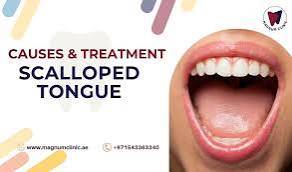Scalloped Tongue
A scalloped tongue, also called crenated tongue, is a condition where the edges of the tongue appear wavy or ridged, resembling teeth imprints. It is often a sign of an underlying condition rather than a disease itself.
---
Causes of Scalloped Tongue
1. Tongue Enlargement (Macroglossia)
The tongue presses against the teeth due to its size.
2. Bruxism (Teeth Grinding)
Repeated pressure from clenching or grinding the teeth at night.
3. Sleep Apnea
Poor airflow during sleep causes tongue enlargement.
4. Vitamin or Mineral Deficiency
Low levels of iron, vitamin B12, or folate can contribute.
5. Dehydration
Leads to swelling and enlargement of the tongue.
6. Hypothyroidism
Reduced thyroid function can cause tissue swelling, including the tongue.
7. Allergic Reactions
Swelling due to food or environmental allergens.
8. Mouth Breathing
Can lead to tongue dryness and enlargement.
9. Temporomandibular Joint (TMJ) Disorder
Jaw misalignment or tension impacts the tongue's position.
10. Chronic Stress or Anxiety
May result in habitual clenching or pressing of the tongue against teeth.
---
Signs of Scalloped Tongue
1. Wavy or ridged edges of the tongue.
2. Indentations matching the teeth’s shape along the sides.
3. Swelling or enlargement of the tongue.
4. Mild discomfort or sensitivity in some cases.
5. Changes in tongue texture or color (if related to other conditions).
---
Effects of Scalloped Tongue
Oral and Physical Effects
1. Discomfort or irritation along the tongue’s edges.
2. Difficulty chewing or speaking if the tongue is significantly swollen.
3. Increased risk of oral infections from tissue damage.
4. Teeth wear from grinding or clenching.
Underlying Health Effects
5. Sleep disturbances due to sleep apnea.
6. Nutritional issues from deficiencies.
7. Hormonal imbalances linked to thyroid dysfunction.
8. Jaw pain or headaches from TMJ disorders.
9. Stress-related tension affecting overall oral health.
Psychological and Social Effects
10. Self-consciousness or embarrassment due to tongue appearance.
---
Solutions and Management
Address Underlying Causes
1. Hypothyroidism Treatment:
Thyroid hormone replacement therapy to reduce swelling.
2. Manage Sleep Apnea:
Use of CPAP machines or oral devices to improve airflow.
3. Nutritional Supplements:
Boost levels of iron, vitamin B12, or folate through diet or supplements.
4. Reduce Allergens:
Identify and avoid food or environmental triggers.
Oral Health Care
5. Mouth Guards:
To prevent teeth grinding and reduce pressure on the tongue.
6. Hydration:
Drink plenty of water to prevent tongue dryness and swelling.
7. Good Oral Hygiene:
Regular brushing, flossing, and dentist visits to prevent infections.
Lifestyle Changes
8. Stress Management:
Techniques like yoga, meditation, or therapy to reduce clenching or grinding.
9. Change Breathing Habits:
Use nasal strips or breathing exercises to encourage nasal breathing.
Medical Interventions
10. TMJ Disorder Treatment:
Jaw exercises, physical therapy, or dental adjustments to relieve tension.
Dietary Adjustments
11. Anti-inflammatory Diet:
Reduce swelling by avoiding processed foods and consuming fruits, vegetables, and omega-3 fatty acids.
When to See a Doctor
Seek professional evaluation if the scalloped tongue persists, worsens, or is accompanied by:
Pain or discomfort.
Difficulty swallowing or speaking.
Signs of underlying conditions like fatigue, weight gain, or breathing issues.
By addressing the root cause, most cases of scalloped tongue can be resolved or significantly improved.


